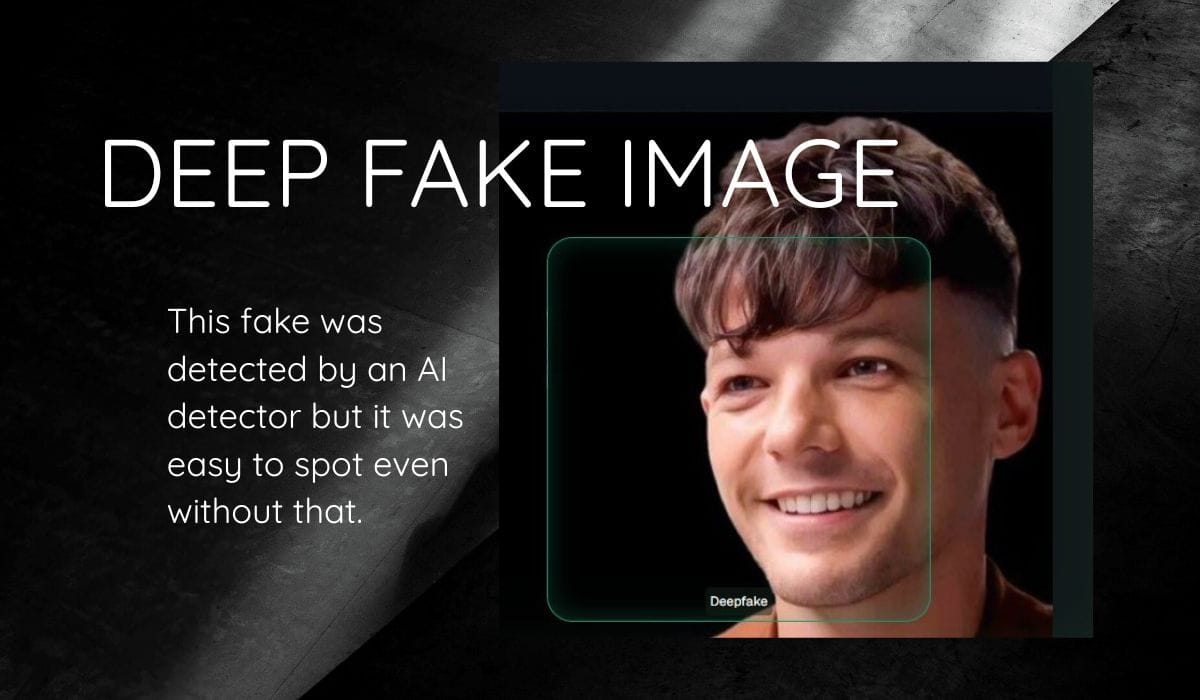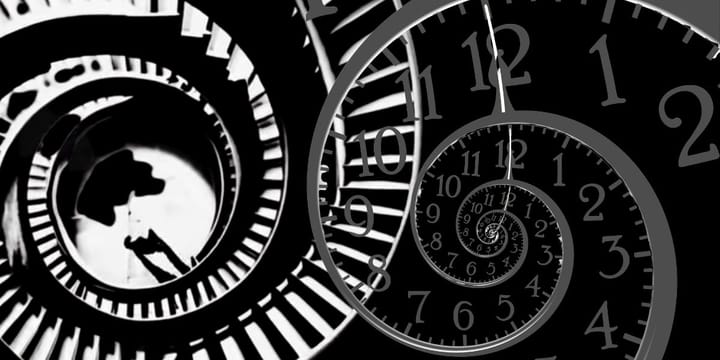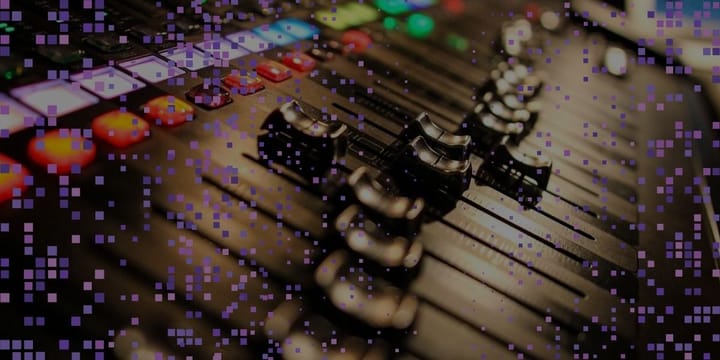When Authenticity Gets Replaced by AI
If AI begins to blur the line, first in photos, then in vocals—we lose your ability to know what’s real. We lose your ability to hold anyone accountable. And the artist loses the one thing that gives them leverage over the machine: a direct, human connection with their audience.

A few days ago I posted on Instagram about a promotional image for Louis Tomlinson’s upcoming appearance on The Diary of a CEO podcast. At first glance it looked like any other press shot: Louis against a dark background, slick and professional. But I have followed Louis for a long time and seen a thousand real photos (and a lot of manips and photoshopped ones)—but this one is different. The skin was waxy. The eyes felt vacant. The symmetry was off. The smile didn't even look right.
Even though it was posted as part of a legitimate promo, it’s not a legitimate photo. It’s a deepfake, an AI-generated image. The biggest question is why it was done and who did it?
Let’s get one thing clear right away: I don’t believe Stephen Bartlett, the host of The Diary of a CEO, had anything to do with creating this image. His show has high production values, access to guests’ official press kits, and a reputation for honesty. If anything, this image was almost certainly supplied to him, either by Louis’s label, his management, or a third-party contractor hired to handle promo assets (his PR agency?). Bartlett’s team posted what they were given.
That’s exactly what makes this odd. Louis’s management, label, and promo team have access to hundreds of high-quality, current approved images. They could easily have taken one of those, adjusted the background to match Bartlett’s style, and called it a day. Instead, they provided a deepfake?
There are only a few plausible reasons a label or management team would do this:
Cutting costs and time. If the artist isn’t available for a new shoot, AI can “freshen up” old photos instantly. No way!
Buzz and novelty. Deepfakes are trendy. A weird image sparks conversation, clicks, and speculation, any publicity is good publicity. No way!
THIS >>>>> Testing boundaries. The industry watches fan reactions like a lab experiment. I posted about this before. They are testing. Slip in a synthetic image. See who notices. If backlash is small, move to the next stage.
This is the part that worries me. Because if the people controlling Louis’s promo assets are already testing AI likenesses in photos, what’s next? Voice clones? AI-generated duets? “Bonus tracks” he never sang? We’re at a point where technology makes all of that easy, and contracts written years ago often give labels or management the right to do it without the artist’s explicit consent.
Authenticity Was Always Louis’s Superpower
Louis has built his solo career on authenticity. Among all the members of One Direction, he stood out as the one most grounded, most connected to his fans, least willing to play along with industry games. His shows were raw and vulnerable, not choreographed spectacles. His last tour succeeded because it felt real—because fans could see and hear him.
That authenticity isn’t just a personal trait; it’s a competitive advantage. It’s the reason he has one of the most loyal fanbases after all these years. It’s also the hardest thing for the industry to replicate or control. Which is exactly why undermining it can be so effective.
When an artist’s authenticity is a threat to corporate control, the playbook looks like this:
- Confuse the narrative. Use PR stunts, rumors, odd promo choices, or contradictory messaging to make the artist seem inconsistent.
- Erode trust. Fans start asking, “Is he really like this? Has he changed? Is he selling out?” Confusion softens loyalty.
- Reframe the brand. Once the old image feels unreliable, management can reposition the artist, introduce new sounds, or even roll out AI likenesses without as much pushback.
This isn’t just speculation; it’s how brand management works. In PR terms, it’s called “narrative reframing.” You don’t fight a strong brand head-on; you chip away at the core that makes it powerful until the audience accepts a new version.
This Year’s Pattern
Look back at the past six-plus months. We had a series of PR stunts and promo moves that didn’t feel like Louis at all. Fans noticed abrupt changes, relationships highlighted in ways that didn’t fit his established personality, and marketing tactics that felt manufactured rather than organic. There's more to talk about here but that's another post.
Now, right before the release of a new album, we’re seeing a deepfake promo image. To me, it looks like a continuation of the same pattern: attack the authenticity first, then roll out a controlled narrative (Rolling Stone?). Whether that’s just a slicker marketing plan or the prelude to AI voice cloning, it deserves scrutiny. I’m here for it.
And then I remembered the TikTok video Louis just did, where he speculates on the album title in his own unmistakable and heavy accent. He leaned into certain words, drew out syllables in a way that felt exaggerated. It was interesting, recognizable, but slightly offbeat even for him. Then my mind goes back to May 2023, when he added those extra finger tattoos, and you start to see a pattern. Louis has always been strategic, technical, and aware of industry’s moves.
What if these are his boilerplates—his way of planting markers that only he controls? Is he trying to show us something about how to tell the real from the fake before the industry blurs those lines even further?
For Louis fans authenticity was never just a marketing word. It’s the reason we connected to him in the first place. We didn't just love his music, we loved him. It’s why we bought the tickets, the merchandise, and the albums. It’s the trust we have that the person we’re supporting is really the one creating the art.
If AI begins to blur that line, first in photos, then in vocals—we lose your ability to know what’s real. We lose your ability to hold anyone accountable. And the artist loses the one thing that gives them leverage over the machine: a direct, human connection with their audience.
I’m not accusing Bartlett of anything. I’m not even saying this is definitely a grand plan by the label. But I am saying that a deepfake promo image is a warning sign. If management or labels are testing AI likenesses today, it’s reasonable to ask whether they’ll test AI voices tomorrow.
That’s why I’ll be watching and listening when Louis’s new music drops. We should ALL be listening for the cracks, the accent, the emotional edges, the little human imperfections that no algorithm can truly replicate. And I’ll be paying attention to how promo materials evolve. Because this isn’t just about one artist. It’s about the future of authenticity in music.
Artists deserve contracts that protect their likeness and voice from unauthorized AI use. Fans deserve to know when an image or a vocal is synthetic. Labels and managers should disclose when they’re using AI in promotional material or recordings. Until that happens, the burden falls on us to notice, to ask questions, and to push back.
Because if authenticity can be attacked and replaced with an algorithm, the connection between artist and audience—the thing that made fandom powerful in the first place, will be gone. So will the artist.



